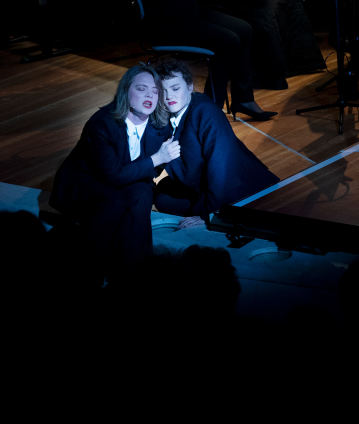Philharmonic chamber music: Dream sequences and harlequinades

Franz Schreker and Arnold Schoenberg were among the musical visionaries of belle époque Vienna. Schreker, as Der Wind shows, remained attached to the sensuous tonal language of the fin de siècle. Schoenberg also made use of this style in his opulent early work Verklärte Nacht. Shortly after, he broke new ground with the avant-garde Pierrot lunaire. All three works captivate the listener with their dreamlike, rapturous atmosphere.
Arnold Schoenberg, born in 1874, and Franz Schreker, who was four years younger, knew and held each other in high regard. Schreker was even the conductor for the premiere of Schoenberg’s Gurrelieder, which gave Schoenberg his greatest public success.
Schreker’s ballet music Der Wind shows off his unmistakable style, a harmonic language full of dazzling colours. He wrote the ballet in 1910 to a scenario by the then famous dancer Grete Wiesenthal. The music depicts a group of young dancers fleeing to safety as the wind, gentle at the beginning, turns into a storm. In the final section, a descending cello line sounds like a direct quotation from Schoenberg’s then ten-year-old tone poem Verklärte Nacht.
In this composition by the 25-year-old Schoenberg, various influences combine to create a tonal language of seductive sensuality: the scoring for string sextet is reminiscent of the chamber music of Johannes Brahms, while the strongly chromatic harmonies remind us of Richard Wagner. Based on a poem by Richard Dehmel, the work also follows in the tradition of the symphonic poem.
Compared to the sweeping dramaturgical arc of the single-movement Verklärte Nacht, Pierrot lunaire – premiered in Berlin in 1912 – is characterised by short, sharply defined and at the same time dreamlike, surrealistic scenes. The poems by the Belgian symbolist Albert Giraud are delivered by a voice that, despite the precisely notated pitches, is intended to alternate between speaking and singing. Under the direction of Stanley Dodds, members of the Berliner Philharmoniker present the work with singer and director Tabatha McFadyen and dancer Allie Graham in a semi-staged performance.
© 2024 Berlin Phil Media GmbH